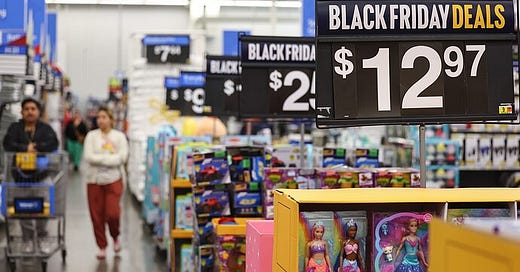How much will you spend during the holidays?
I will spend close to zero. At this point, my family and friends expect that I won’t give gifts for Christmas, and I don’t want gifts. I don’t want to participate, have never wanted to participate, in terms of my attention, time, and money.
I get that some people’s “love language” are gifts. But how much is enough? In my newsfeed today, there’s an CNBC article titled “60% of Americans are living paycheck to paycheck heading into the holidays” with some distressing statistics:
Although inflation is cooling, 60% of adults said they are living paycheck to paycheck. The figure is unchanged from last year.
This year, holiday spending during the Thanksgiving week is expected to hit a all-time record, 13% more than last year. Shoppers are expected to spend on average $567 on Black Friday and Cyber Monday alone. ($875 for the holiday season overall)
Almost all — or 96% — of shoppers said they expect to overspend this season. Meanwhile, credit card debt tops $1 trillion.
Half of consumers plan to take on more debt to pay for holiday expenses.
74% of Americans say they are stressed about finances.
The article talks about how Americans have “a mentality of hyperconsumption.” When 96% of Americans expect to overspend, that’s hyperconsumption. We live in an addictive society when half of us are planning to take on more debt to spend.
And we think of this as “success”
One question I’ve been asking my current FF1 cohort: how does your spending compare now to when you were in your 20s? Has that spending made you happier?
The hedonic treadmill is real and it happens to all of us. As we earn more money, we learn to spend it. Advertising, social media, the expectations of our social circle. And because of this, 60% of Americans live paycheck to paycheck. 80% of Americans don’t keep a budget.
Some statistics: median family income adjusted for inflation:
$29,000 in 1955
$42,000 in 1965
$70,784 in 2021
Yes, you read that right: the median family income in 1955 was $29,000, in today’s dollars.1 As our salaries have increased, we’re buying more things when we could bought our freedom. The average size house built in 1955 was 950 square feet. Now it is almost 2500 square feet. We fill that house up with more things. We buy storage units for what doesn’t fit. We spend more that didn’t exist (electronics) or were super expensive and have become cheap (travel). Our expectations of what is materially enough keep creeping up, slowly and inexorably. What was enough before is no longer enough.
We could have stopped working so hard, for so many extra years. We could have arrested climate change.2 But consuming more and more is our version of “success” and “the good life.”
We consume unconsciously, even going into debt to do so. As a society, we have a spending problem that masks a much deeper spiritual malaise.
How much will you spend during the holidays?
Economists would suggest that incomes have increased because Americans spend more; more spending is the reason for our economic growth. But all this means is that we’re running in place.
Don’t blame “corporations.” The only reason climate change exists is our addiction to personal consumption. Which corporations feed. Oh, and the number of years you work is directly correlated to your consumption.




